Milan, 22 February. The day is gloomy: the clouds are playing with each other, the rain skims the passers-by. The sky is the same shade as the Duomo. Yet, there is colour throughout the city. The ferment of Fashion Week is evident, there is no stopping it, starting with what begins and develops in Palazzo Giureconsulti. We head into the city’s oldest congress centre: we go up to the first floor, enter the Sala Parlamentino. It is enveloped in silence, embraced by darkness. In that impressionistic chiaroscuro, the spotlight is on a figure on whom the gazes of those present converge. A woman with long golden hair is standing still, but travelling through unknown thoughts. You can surmise that by observing her ocean-blue eyes, lost in waves that she may not know how to tame. The woman is Anna Favella, a well-known face from Italian and international theatre, cinema and television. Behind her is the immersive installation Nature in Parliament by Tiziano Guardini and Luigi Ciuffreda, the active backdrop for the live performance of which she will be the protagonist a few moments later.
Yes, because the actress is bringing her contribution to the third edition of Fashion for Planet Open Parliament, an event organised by Cittadellarte Fashion B.E.S.T. and the National Chamber of Italian Fashion with the collaboration of GARN – Global Alliance for the Rights of Nature and Accademia Unidee, which aims to give voice to the rights of nature through an artistic language. Anna, it goes without saying, takes part in it relying on one of her most precious talents: acting. Thus her performance begins. An immediate pathos, which cuts through all distractions. First, a speech recorded by her propagates across the hall, offering a reflective experience to the onlookers. After the playing of the recording, she enters into the heart of the performance. In fact, this is not an individual show, but a collective one: Anna in fact brought nature to listen not just to her, but also to the speeches of the speakers of the two previous editions of Fashion for Planet Open Parliament, whose excerpts she recited. Past and present, one and many, dream and reality, nature and artifice. In short, an embrace between opposites that hints at Michelangelo Pistoletto‘s Third Paradise. So, to relive the performance, we interviewed the person who gave it form, embarking on an introspective journey into Anna Favella’s artistic and personal life.
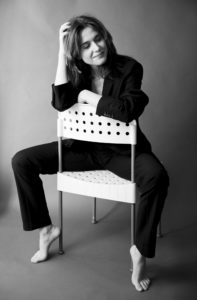
Photo by Manuela Giusto.
Anna, let’s look back at the third edition of Fashion for Planet Open Parliament focusing on your artistic contribution. On a conceptual level, what is behind your performance at Palazzo Giureconsulti? what was the key message you wanted to convey?
The performance consisted of two parts. The first centred on a video: I wrote and interpreted the text that accompanied the film projected on Guardini and Ciuffreda’s installation, the result of our suggestions and those of Olga Pirazzi. We wanted to give voice to nature, because we realised that human beings no longer listen to it, even though it should be our beacon and compass. I therefore proposed a lyric with poetic overtones, almost an ode, in which I made the human being take on the role of a Martian; in short, an alien on his own planet, because not only is he unable to hear and understand the language of other living species, he even goes as far as harming them. In this song that attunes the human being towards nature, an unsettling situation is revealed: the subject, frightened, does not know how to take care of the planet, because he does not know it. Quoting Stefano Mancuso, how can I in fact love or protect something I do not know? My invitation is to listen and observe what surrounds us. Indigenous peoples are a virtuous example, because they integrate themselves harmoniously into the ecosystem and into all existence, respecting the seasons and natural cycles even in their choice of food. I report, in this regard, a reflection by a shaman from the Amazon rainforest: for him and his people, the forest represents home, but also the market, the pharmacy and the nourishment. The second part of the performance consisted in sharing a series of extracts from the speeches of the previous editions of Fashion for Planet. I was fascinated by the fact that, although coming from speakers of different generations and professions, the words I read all carried the same message, namely to respect nature.
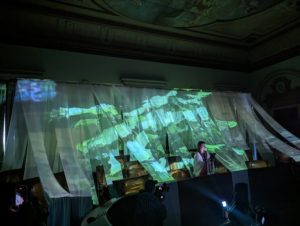
Anna Favella’s live performance. Photo: Journal staff.
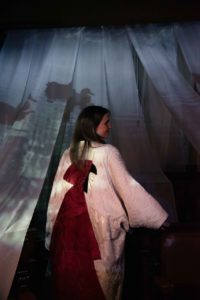
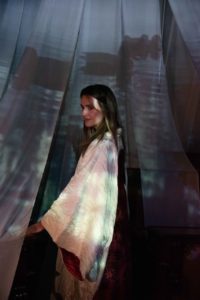
Anna Favella at Palazzo Giureconsulti (photo by Valerie Khoury).
Actress on stage and activist in everyday life: in your Instagram bio and on your website, you identify yourself as an ‘Earth Lover’. You are also an ambassador for the likes of Amnesty International and One Ocean Foundation. Where does this focus on environmental issues and human rights come from?
It started a long time ago, when sustainability was not yet a global trend topic. Animals and nature are interests that I have always cultivated, and they developed in parallel with my professional growth as an actress. I have indeed felt the responsibility, as a public figure, to influence people on these issues; social media, in this sense, have been and still are an immediate and powerful means of communication. I also noticed that it was mainly the younger generation to follow me on my channels: echoing these issues on Instagram, raising awareness among a younger base in particular, is one of my ways of doing activism. These communication dynamics are challenging, but they enrich me on a human level. The passion, over time, has become a mission: I decided to support Amnesty International and One Ocean Foundation. This collaboration has resulted in numerous projects focused on respect for others, which have led me, for example, to a series of centres dedicated to the protection of women victims of violence in Morocco. As far as my involvement with One Ocean is concerned, I should explain my bond with water: I grew up between the seaside resorts of Nettuno and Anzio, in Lazio, and in the beauty of eastern Sicily, my mother’s home region; it therefore goes without saying that the bond with this natural element is visceral for me. In short, I cannot but be sensitive to the conditions in which the marine world finds itself: human beings, in a continuous prevarication, are destroying this habitat as well. Here, we must stir consciences and work on solutions without delay, before it is too late.
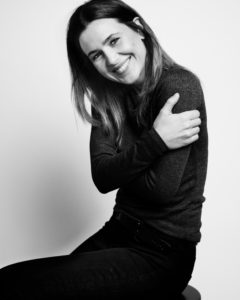
Photo by Manuela Giusto.
Let’s go back to Cittadellarte and the Chamber of Fashion’s event, dedicated to sustainable fashion and the relationship between ethics and aesthetics. Can you explain your commitment on this front?
Personally, whenever possible, I also try to communicate through the way I dress. For example, when I gave the performance at the Fashion for Planet Open Parliament, I was wearing a kimono by Tiziano Guardini, a designer who is very sustainability conscious. Fashion, for me, is not just a commercial industry, but a way to communicate our personality. It is gratifying, in this respect, to have an identity in dressing that is in harmony with our natural and social spheres; this is also why I am happy to introduce brands that make sustainability their strong suit. The ethical aspect can also be declined in other areas, such as food. As a rule, we can do our part to save the planet through every daily choice.
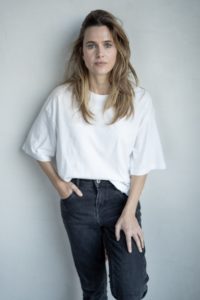
Photo by Paolo Palmieri.
The clothes we wear are said to be our second skin. The world of show business, however, leads you to wear different clothes all the time, in a constant change of outfits that is essential to the process of portraying the characters you play. What is your relationship with clothing in light of this?
Clothing is a fundamental part of the narrative process. I believe that the character only really begins to build and come to life at the dress rehearsal: it is then that the identity is created. Personally, I think it is a magical moment, when the real person merges with the person they are playing, becoming one with their counterpart. What we wear also conveys the disposition and the life of the character, which is why I also give a lot of importance to details, such as accessories or jewellery. I confess, however, that under certain circumstances it was difficult for me to accept stage clothes, because I did not always feel comfortable in them. For a TV series, for example, I had to wear 19th century costumes that were very far from the comfort we are used to, witch corsets, ankle boots and large skirts, and yet the character I played had to be very dynamic. It was challenging to work and find a balance on these contrasts.
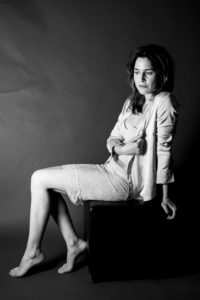
Photo by Manuela Giusto.
You graduated in Philosophy of Language at La Sapienza University in Rome. With reference to human language and its communication systems, how can you effectively raise social awareness on the topic of sustainability? Do you feel a responsibility towards your community when it comes to this theme?
Social networks can be an important tool, they have immense potential: they are an immediate medium, even if the frenzy that characterises them does not give users time to reflect in detail on the content. I do feel a responsibility to direct my community on issues of global relevance, acting as a megaphone for what science has proven. It would be enough to give weight to authoritative sources and listen to those with expertise in the field to know that the environmental emergency is real: we are even beginning to see tangible signs of the climate crisis. No one can hide from scientific evidence.
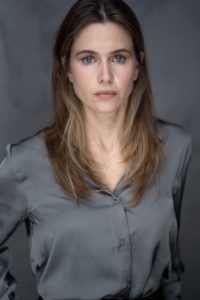
Photo by Paolo Palmieri.
In the film Don’t Look Up, starring Jennifer Lawrence and Leonardo Di Caprio, the indifference of governments and the media towards global warming is satirically and allegorically addressed. As a public figure ranging from television to social media, do you think it is possible, in 2024, to pierce the screen by drawing attention to the climate crisis? Or is there not enough media resonance on the issue?
Unfortunately, there is not enough media resonance, these topics should be dealt with more, not only in the media but also in the political arena, not to create alarmism, I should emphasise, but to be proactive and provide information and tools to those who do not have them. As I stated earlier, you cannot protect something that you do not understand in its entirety. Knowledge and awareness are therefore the key factors that can lead to action for change.
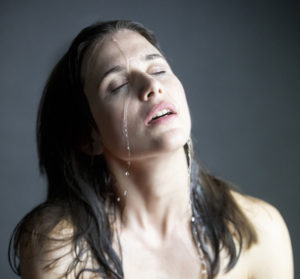
Photo by Manuela Giusto.
Let’s look at the future of the Earth and its inhabitants: if our planet were a film set, what condition would it be in 100 years from now? Are the apocalyptic prospects inescapable or can everything still change direction?
This comparison is apt: our planet, like a set, is a bubble. We are supposed to take care of it for the success of the film, while we are actually destroying it. Think, for example, of deforestation, which causes double the damage: the felling of a tree does not affect the single plant, but the entire ecosystem. As for the future, I want to be positive and believe in a deus ex machina. A stall, however, will lead to disaster, because this positive turn of events will never happen if we do not work to make it happen.
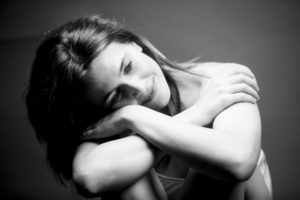
Photo by Manuela Giusto.
To conclude, Anna, let us trigger a reflection inspired by the mirror paintings, which are the foundation of Michelangelo Pistoletto‘s work. Using the same medium, albeit on different levels, I invite you to look in the mirror. What do you see?
Anna as an actress looks a little more in the mirror for professional reasons, also to try out parts and get to know her new identities. But Anna as a person has always had difficulty seeing herself in the mirror. Today, I finally can, because, in a theatrical parallelism, I have taken off a few masks. So, to answer your question, today I see Anna, or perhaps someone or something close to her. What do I mean? I believe that we can only know ourselves in depth with the passing of time. It is an intimate, ever-evolving process. However, I am certain that engaging with sustainability through my means of expression recharges me, makes me feel better even when I look in the mirror. After all, this conversation of ours was enough to make me pause: a simple exchange has generated precious creative sap in me that will feed my desire to change the world again.

